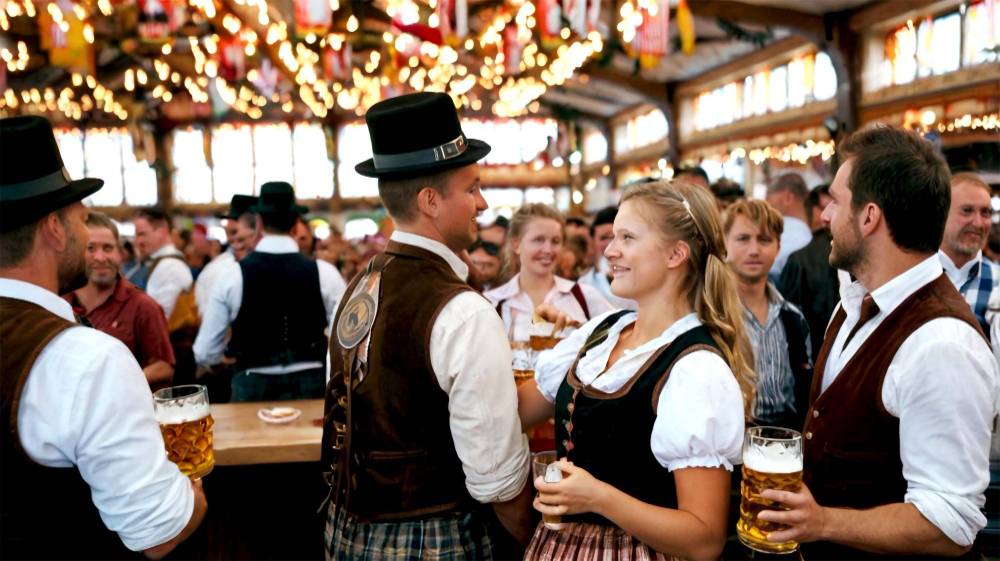Germany is a country rich in traditions and cultural customs, many of which revolve around gift-giving. From the lively celebrations of Oktoberfest to the festive joy of Christmas, each occasion brings its unique flair to the practice of giving gifts. This article explores the distinct customs associated with gift-giving in Germany, providing insights into what makes these traditions special. Whether you’re planning to send German gift baskets or are simply interested in learning more about these cultural practices, this guide will offer valuable information and tips.
Oktoberfest: A Celebration of Bavarian Culture
History and Significance
Oktoberfest, held annually in Munich, is the world’s largest Volksfest (folk festival) and a significant part of Bavarian culture. It began in 1810 to celebrate the marriage of Crown Prince Ludwig to Princess Therese of Saxe-Hildburghausen. Today, it attracts millions of visitors who come to enjoy the festivities, including traditional music, dances, and, of course, beer.
Gift-Giving Traditions
While Oktoberfest is primarily about celebration and enjoyment, gift-giving plays a subtle yet meaningful role. Common gifts during Oktoberfest include:
- Lebkuchenherzen (Gingerbread Hearts): These decorated gingerbread cookies are inscribed with sweet messages and are a popular gift among friends and couples.
- Traditional Bavarian Clothing: Gifting a Dirndl or Lederhosen can be a thoughtful and culturally significant gesture, especially for those who partake in the festivities.
- Beer Steins: Authentic German beer steins, often intricately designed, make excellent gifts for beer enthusiasts. For more on these, check out Authentic German Steins.
St. Martin’s Day: Lanterns and Sweets
Celebrating St. Martin
St. Martin’s Day, celebrated on November 11th, honors St. Martin of Tours, known for his acts of kindness and charity. The day is marked by children parading through the streets with handmade lanterns, singing songs, and receiving sweets.
Gift-Giving Traditions
Gift-giving on St. Martin’s Day focuses on children and includes:
- Handmade Lanterns: Often crafted at home or in school, these lanterns are sometimes exchanged as gifts among children.
- Sweets and Treats: Chocolate and candies are commonly given to children during the lantern parades.
- St. Martin’s Bread: Also known as “Weckmänner,” these sweet bread men are baked in the shape of the saint and are a traditional gift for children.
Christmas: The Pinnacle of German Gift-Giving
Advent and Christmas Markets
The Christmas season in Germany is a magical time, beginning with Advent and marked by the opening of Christmas markets (Weihnachtsmärkte) across the country. These markets are famous for their festive atmosphere, where visitors can buy unique gifts, enjoy seasonal foods, and partake in various holiday activities.
Gift-Giving on Nikolaustag
On December 6th, St. Nicholas Day (Nikolaustag) is celebrated. Children place their shoes outside the door in hopes that St. Nicholas will fill them with small gifts and sweets.
Christmas Eve and Christmas Day
The main gift-giving event occurs on Christmas Eve (Heiligabend). Families gather for a festive meal, after which they exchange gifts. Traditional gifts include:
- Handcrafted Items: Christmas markets are an excellent source of handmade gifts, such as wooden toys, ornaments, and crafts. For more inspiration, visit German Christmas Market Gifts.
- Books and Puzzles: Intellectual and educational gifts are popular among families.
- Food and Drink: Gourmet hampers filled with German delicacies, such as stollen (fruit bread), marzipan, and fine wines, are cherished gifts. Explore options at Specialty Food Shops.
New Year’s Eve: Silvester Celebrations
Bringing in the New Year
New Year’s Eve, known as Silvester in Germany, is celebrated with fireworks, parties, and a variety of traditions meant to bring good luck for the coming year.
Gift-Giving Traditions
Gifts during Silvester are typically tokens of good luck and include:
- Four-Leaf Clovers and Lucky Pigs: Small figures of clovers or pigs (Glücksschweinchen) are given to symbolize good fortune.
- Marzipan Treats: Marzipan pigs or other shapes are popular gifts.
- Personalized Calendars: A thoughtful gift to help loved ones plan their year ahead. Check out Personalized Calendars for customizable options.
Understanding German Gift-Giving Etiquette
Dos and Don’ts
When giving gifts in Germany, it’s important to follow certain etiquette rules to ensure your gesture is well-received:
- Do: Wrap gifts nicely. Presentation is important in German culture, and a beautifully wrapped gift shows thoughtfulness.
- Don’t: Give overly extravagant gifts. Moderation and practicality are valued, so avoid gifts that may seem too lavish or unnecessary.
- Do: Bring a small gift when invited to someone’s home, such as flowers, chocolates, or a bottle of wine.
- Don’t: Expect gifts to be opened immediately. While some may open gifts right away, others may wait until later.
Conclusion
German gift-giving customs are deeply rooted in the country’s rich cultural traditions, from the lively Oktoberfest to the festive Christmas season. Understanding these customs and adhering to proper etiquette can enhance your gifting experience, making it more meaningful and appreciated.

